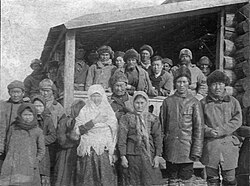Suku Evenk (juga disebut Ewenki atau Evenki) (otonim: Эвэнкил Evenkil; bahasa Rusia: Эвенки Evenki; Hanzi: 鄂温克族 Èwēnkè Zú; dulunya dikenal sebagai Tungus atau Tunguz; bahasa Mongol: Хамниган Khamnigan) adalah sebuah suku bangsa Tungusik dari Asia Utara. Di Rusia, suku Evenk dianggap sebagai salah satu suku asli Rusia Utara, dengan populasi 38,396 (sensus tahun 2010). Di China, suku Evenki membentuk salah satu dari 56 kelompok etnis yang resmi diakui oleh Republik Rakyat China, dengan populasi 30,875 (sensus 2010).[2] Terdapat 537 orang Evenk, yang disebut Khamnigan dalam bahasa Mongolia, di Mongolia (sensus 2015).[10]
Fakta Singkat Эвэнкил, Jumlah populasi ...
Suku EvenkЭвэнкил |
|---|
 Sebuah keluarga Evenk pada awal 1900-an |
|
| 69,856[1][2][3][4] |
|
 Rusia Rusia | 38,396[1] |
|---|
 China China | 30,875[2] |
|---|
 Mongolia Mongolia | 537[5] |
|---|
 Ukraina Ukraina | 48[6] |
|---|
|
| Evenki, Rusia, Tionghoa |
|
| Shamanisme, Kristen Ortodoks, Buddha Tibetan[7][8][9] |
|
| Even, Manchu, Oroqen, Oroch |
Tutup
Шубин А. Ц. Краткий очерк этнической истории эвенков Забайкалья (XVIII-XX век). Улан-Удэ: Бурят. кн. изд-во, 1973. С. 64, 65 (Rusia)
- D. O. Chaoke (an Evenk), WANG Lizhen (2002). 鄂温克族宗教信仰与文化 (Zipped NLC (Modified JBIG)). Beijing: 中央民族大学. ISBN 978-7-81056-700-8.
- "Altaic." Columbia Electronic Encyclopedia. 6th ed. 2009. Academic Search Premier. EBSCO. Web. 4 Nov. 2009.
- Anderson, David G. "Is Siberian Reindeer Herding in Crisis? Living with Reindeer Fifteen Yearss after the End of State Socialism." Nomadic Peoples NS 10.2 (2006): 87-103. EBSCO. Web. 6 Nov. 2009.
- Bulatova, Nadezhda, and Lenore Grenoble. Evenki. Munchen: LINCOM Europa, 1999. Print. Languages of the World.
- "Evenki." Cassell's Peoples, Nations, and Cultures. Weidenfeld & Nicolson, 2005. EBSCO. Web. 4 Nov. 2009.
- "Evenki." Ethnologue: Languages of the World, Sixteenth Edition. Ed. Paul M. Lewis. SIL International, 2009. Web. 8 Dec. 2009.<http://www.ethnologue.com/show_language.asp?code=evn>.
- Fondahl, Gail. Gaining ground? Evenkis, land and reform in southeastern Siberia. Boston: Allyn and Bacon, 1998. Print.
- Forsyth, James. History of the Peoples of Siberia: Russia's North Asian Colony, 1581-1990. Cambridge: Cambridge UP, 1992. Print.
- Georg, Stefan, Peter A. Michalove, Alexis M. Ramer, and Paul J. Sidwell. "Telling general linguists about Altaic." Journal of Linguistics 35.1 (1999): 65-98. JSTOR. Web. 8 Dec. 2009.
- Hallen, Cynthia L. "A Brief Exploration of the Altaic Hypothesis." Department of Linguistics. Brigham Young University, 6 Sept. 1999. Web. 8 Dec. 2009.<http://linguistics.byu.edu/classes/ling450ch/reports/altaic.htm>.
- Janhunen, Juha. "Evenki." Interactive Atlas of the World's Languages in Danger. Ed. Christopher Moseley. UNESCO Culture Sector, 31 Mar. 2009. Web. 8 Dec. 2009.<https://web.archive.org/web/20090222090430/http://www.unesco.org/culture/ich/index.php?pg=00206>.
- Nedjalkov, Igor. Evenki. London: Routledge, 1997. Print. Descriptive Grammars.
- Sirina, Anna A. "People Who Feel the Land: The Ecological Ethic of the Evenki and Eveny." Trans. James E. Walker. Anthropology & Archaeology of Eurasia 3rd ser. 47.Winter 2008-9 (2009): 9-37. EBSCOHost. Web. 27 Nov. 2009.
- Vasilevich, G. M., and A. V. Smolyak. "Evenki." The Peoples of Siberia. Ed. Stephen Dunn. Trans. Scripta Technica, Inc. Chicago: The University of Chicago, 1964. 620-54. Print.
- Vitebsky, Piers. Reindeer people: Living with Animals and Spirits in Siberia. Boston: Houghton Mifflin, 2005. Print.
- Wood, Alan, and R. A. French, eds. Development of Siberia: People and Resources. New York: St. Martin's, 1989. Print.
